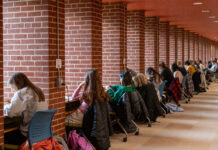In light of Autism Awareness Month, special education students at SRU have been considering measures that they will take to help effectively teach children with autism in the future.
According to Dr. Joseph Merhaut, associate professor and chair of the Special Education Department, students in the department are provided with specialized instruction to help prepare them to teach children affected by all forms of autism.
“What a lot of people may or may not know is that the autism spectrum is very broad, which means that it can range anywhere from very mild to very severe autism,” Merhaut said.
According to Merhaut, depending on the form of autism, children experience different types of challenges. The most common include poor social skills, limited or no verbal skills, trouble processing language, and sensory integration problems, which may include things such as the lighting in the room or the sounds in the hallway.
“In our department, we offer a class specifically dedicated to teaching children with autism,” Merhaut said. “This
By Stephanie Holsinger
Rocket Copy Editor
In light of Autism Awareness Month, special education students at SRU have been considering measures that they will take to help effectively teach children with autism in the future.
According to Dr. Joseph Merhaut, associate professor and chair of the Special Education Department, students in the department are provided with specialized instruction to help prepare them to teach children affected by all forms of autism.
“What a lot of people may or may not know is that the autism spectrum is very broad, which means that it can range anywhere from very mild to very severe autism,” Merhaut said.
According to Merhaut, depending on the form of autism, children experience different types of challenges. The most common include poor social skills, limited or no verbal skills, trouble processing language, and sensory integration problems, which may include things such as the lighting in the room or the sounds in the hallway.
“In our department, we offer a class specifically dedicated to teaching children with autism,” Merhaut said. “This helps our students understand all of the characteristics of autism and helps them learn strategies to work with autistic children.”
Some of these strategies include behavioral assessments and adapting lessons to individual students based on these assessments. According to Merhaut, special education students at SRU learn some of the aspects of an approach that is known as applied behavioral analysis. Once an autistic student’s behavior is assessed and the causes of specific behaviors are determined, a teacher is then prepared to adjust and adapt the classroom or other learning environment accordingly.
Behavioral therapy and intervention is often provided as a supplemental service as part of the academic program for autistic students, Merhaut said.
Recently, the Special Education Department at SRU has implemented a new program in the graduate school called an autism endorsement certificate, according to Merhaut. This program is composed of 12 credits that students must take in order to complete the certification. Undergraduate students may take these courses before they graduate.
“Once students take these four courses, they can actually apply to the state of Pennsylvania to be endorsed,” Merhaut said. “This means, that on a graduate’s teaching certificate, they will have a special endorsement for autism.”
This endorsement will help prospective employers see that graduates have specialized experience with autism as there is no specific degree for it. Students may only earn a degree in special education, not autism.
Merhaut said that although working with children with autism can be rewarding, there are a multitude of challenges that teachers may face, adding that the degree of challenges all depend on where the individual child falls on the autism spectrum.
“Some children with mild autism may be very easy to work with, whereas some children with more severe autism may be more challenging,” he said. “Some children may be completely nonverbal so it may be difficult to determine exactly what the child wants.”
Merhaut believes that Autism Awareness Month and the different activities that are taking place on campus to honor it are beneficial when it comes to shedding light on autism.
“The autism conference that is being held on campus gives our students in the department the opportunity to speak with professionals in the field,” he said. “The special education department is very much involved.”
According to Merhaut, more people are diagnosed with autism every year, and although there are many theories as to the cause of the disorder, nothing is certain. He said he believes that Autism Awareness programs are a growing trend because it is important to help shed light on a disorder that is becoming more prominent in our world every day.







